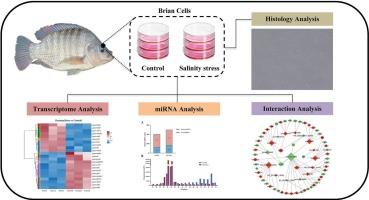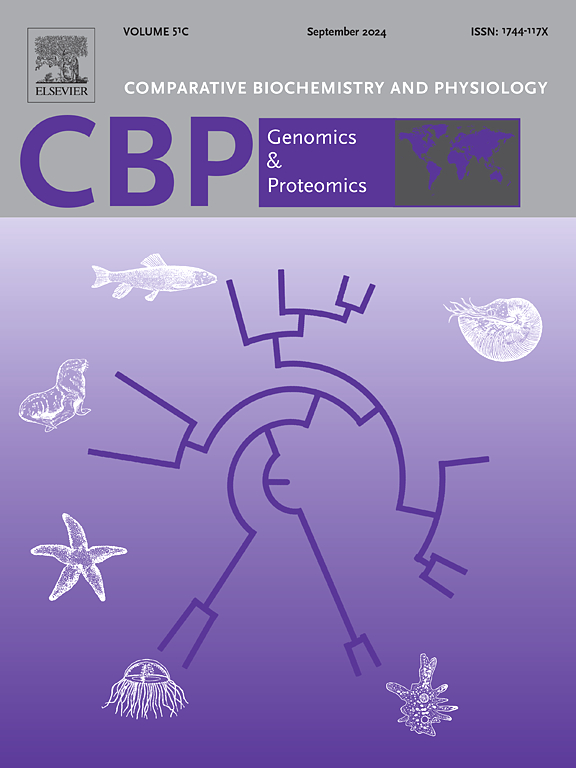Construction and integrative analysis of miRNA-mRNA response to salinity stress in Oreochromis mossambicus cells
IF 2.2
2区 生物学
Q4 BIOCHEMISTRY & MOLECULAR BIOLOGY
Comparative Biochemistry and Physiology D-Genomics & Proteomics
Pub Date : 2024-10-31
DOI:10.1016/j.cbd.2024.101350
引用次数: 0
Abstract
This study investigated the genetic response of tilapia (Oreochromis mossambicus) brain cells to hypertonic stress, focusing on miRNAs regulation. Three hundred and thirty-one known miRNAs and 163 novel miRNAs which responded to hypertonic stress were identified by high-throughput sequencing in tilapia brain cells. Differential expression analysis revealed that 16 miRNAs were significantly upregulated, while 11 miRNAs were significantly downregulated. These differentially expressed miRNAs are closely related to metabolism, immune response, and neural regulation. The target genes of these miRNAs are implicated in neurotrophic and synaptic signaling pathways, potentially affecting metabolic and apoptotic processes. GO and KEGG enrichment analyses provided insights into the biological processes and pathways affected by hypertonic stress. Furthermore, correlation analysis between mRNA and miRNA highlighted miRNA-mRNA interactions related to cell cycle and apoptosis regulation. These results indicated significant changes of miRNA expression under hypertonic stress and their crucial role in osmotic pressure regulation. This study offers a basis for further exploration of miRNA functions and molecular mechanisms in tilapia, potentially informing practices for aquaculture in challenging environments such as saline-alkaline waters.

构建并综合分析大口鲈细胞中 miRNA-mRNA 对盐度胁迫的响应
本研究以miRNAs调控为重点,研究了罗非鱼(Oreochromis mossambicus)脑细胞对高渗应激的遗传响应。通过高通量测序鉴定了罗非鱼脑细胞中331个已知的miRNA和163个对高渗胁迫有反应的新型miRNA。差异表达分析表明,16 个 miRNA 显著上调,而 11 个 miRNA 则显著下调。这些差异表达的 miRNA 与新陈代谢、免疫反应和神经调控密切相关。这些 miRNA 的靶基因与神经营养和突触信号通路有关,可能影响新陈代谢和细胞凋亡过程。GO 和 KEGG 富集分析有助于深入了解受高渗应激影响的生物过程和途径。此外,mRNA 和 miRNA 之间的相关性分析突显了与细胞周期和细胞凋亡调控有关的 miRNA-mRNA 相互作用。这些结果表明,在高渗胁迫下,miRNA的表达发生了重大变化,并在渗透压调节中发挥了关键作用。这项研究为进一步探索罗非鱼体内 miRNA 的功能和分子机制奠定了基础,有可能为在盐碱水域等具有挑战性的环境中进行水产养殖提供参考。
本文章由计算机程序翻译,如有差异,请以英文原文为准。
求助全文
约1分钟内获得全文
求助全文
来源期刊
CiteScore
5.10
自引率
3.30%
发文量
69
审稿时长
33 days
期刊介绍:
Comparative Biochemistry & Physiology (CBP) publishes papers in comparative, environmental and evolutionary physiology.
Part D: Genomics and Proteomics (CBPD), focuses on “omics” approaches to physiology, including comparative and functional genomics, metagenomics, transcriptomics, proteomics, metabolomics, and lipidomics. Most studies employ “omics” and/or system biology to test specific hypotheses about molecular and biochemical mechanisms underlying physiological responses to the environment. We encourage papers that address fundamental questions in comparative physiology and biochemistry rather than studies with a focus that is purely technical, methodological or descriptive in nature.

 求助内容:
求助内容: 应助结果提醒方式:
应助结果提醒方式:


